| [category-description] |
Choose the wrong size hot water heater and you’ll get more than a cold shoulder from the family – you’ll feel it from head to toe… literally!
Whether you’re looking to replace a heater or are starting from scratch, there’s lots to think about –and heating capacity is just the beginning.
|
| [header-image-desktop] |
https://cdn11.bigcommerce.com/s-j5cntfjzkz/product_images/uploaded_images/0131-hot-water-buying-guide-bg2.jpg?t=1619160469&_ga=2.79044503.2090902954.1618790636-899090655.1616022955 |
| [header-image-mobile] |
https://cdn11.bigcommerce.com/s-13ufylmnbu/product_images/uploaded_images/0131-hot-water-buying-guide-bg6-1-.jpg?t=1619736966 |
| [buying-guide-file] |
https://cdn11.bigcommerce.com/s-j5cntfjzkz/product_images/uploaded_images/0131-hot-water-buying-guide-bg4-2.jpg?t=1619160369&_ga=2.2537395.2090902954.1618790636-899090655.1616022955 |
| [green-block-msg] |
“Don’t just guess what system is right for you. If you aren’t sure, ask an expert. That way, you know the system installed is the right system for you and your family. And always ensure a licensed plumber is the one to install it.”
|
| [green-block-author] |
Justin Robinson | Tradelink Banyo |
| [green-block-img] |
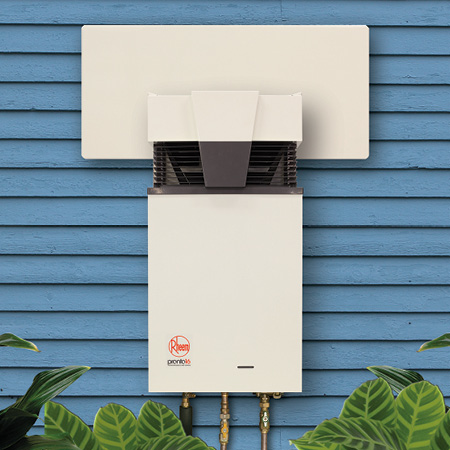 |
| [first-block-title] |
Start by clearing up your hot water needs
|
| [first-block-desc] |
When you think about how often you use hot water during the day (and night!), the importance of your hot water heater becomes clear!
Most are sold when an existing hot water heater has failed – and that means the people doing the buying are usually in one heck of a hurry.
Replacing an old heater with its newer equivalent isn’t always the best option. Giving some thought to your choice is though.
How have your family’s hot water needs changed? Do you want to reduce your water and energy bills? Is a smaller carbon footprint important to you?
Think about what you want and then set about finding a heater that ticks all the boxes and satisfies your budget too.
|
| [first-block-image1] |
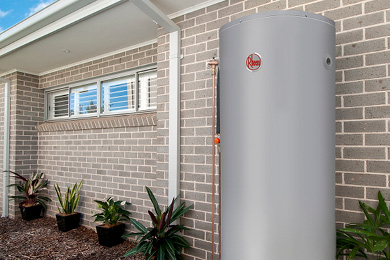 |
| [first-block-image2] |
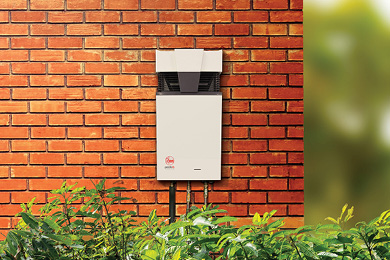 |
| [first-block-image3] |
 |
| [second-block-title] |
Hot water range
|
| [second-block-desc] |
The market really is awash with choice when it comes to hot water heaters. Storage systems, continuous flow, and renewables are all great alternatives worth your consideration.
When making your decision, remember, to avoid being left out in the cold the capacity of your system needs to match your needs. Additionally, the physical size of your heater also needs to match the available space.
It seems obvious that the costs need to match your budget. However, when thinking budget, think about more than the cost of the heater. We can help you to understand the costs of installation and the costs of switching from one type of heating system to another if that’s what you’re thinking of doing.
|
| [second-block-image] |
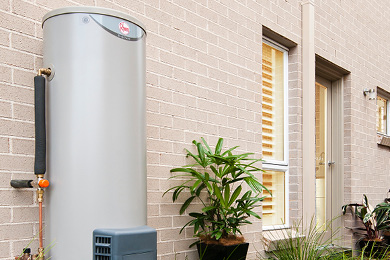 |
| [section_1_heading] |
Product variations |
| [section_1_items] |
| image-container |
third-block-copy |
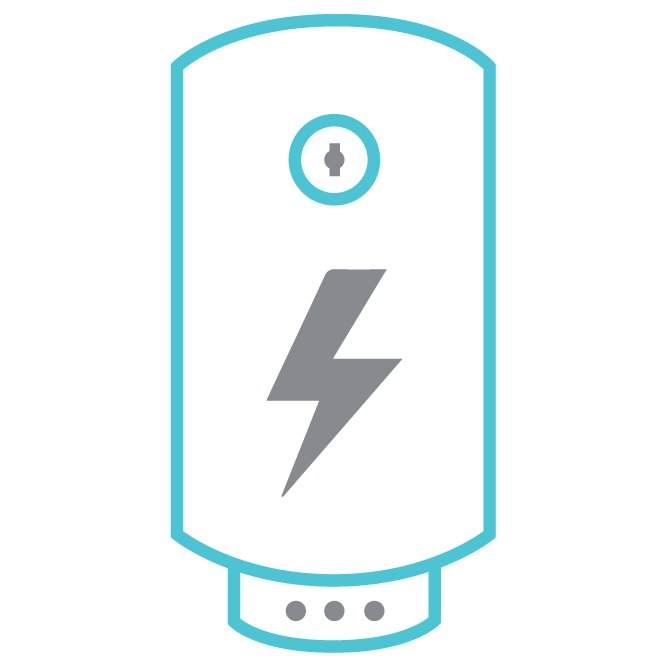 |
Electric storage
An electric storage water heater consists of an insulated cylindrical storage tank, which stores and electrically heats water. The water stored in the tank is kept hot, ready for delivery when needed. Electric water heaters generally have low up-front costs and are easy to install. Off-peak options save on heating costs by only heating water at off-peak times.
|
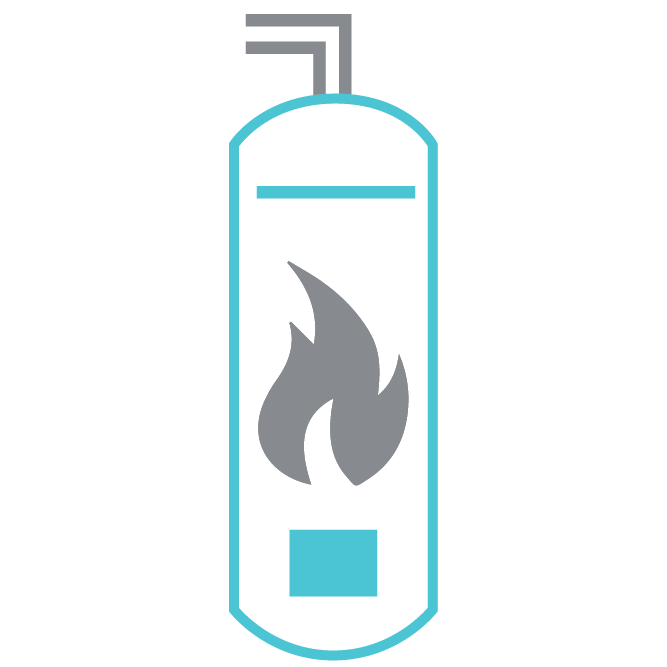 |
Gas storage
A gas storage water heater uses a gas burner located underneath the storage tank. The heat is transferred from the gas burner through the bottom of the tank and the hot, stored water remains available for delivery when needed. Gas storage water heaters are energy efficient and have fewer carbon emissions than similar electric heaters.
|
 |
Continuous flow
Continuous flow hot water heaters are small, wall-mounted, tankless units that heat water as you use it, rather than heating it and storing it for later use. They can be electric or gas, and both provide the advantage of instantaneous hot water. This means never having to have a cold shower after the hot water has run out!
|
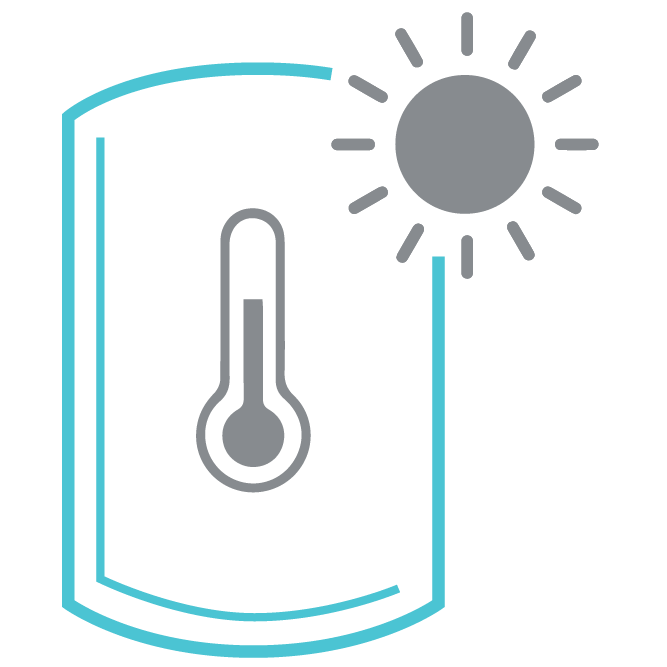 |
Renewables – solar thermal
As the name suggests, solar thermal heating systems draw their energy from the sun to heat your water. The heated water is stored in a cylindrical storage tank, either on the roof with the solar panels or at ground level. They come with a boost function for overcast days. They save on energy costs and reduce your carbon emissions. In some locations, rebates and government incentives may apply.
|
 |
Renewables – electric heat pump
Electric heat pump water heaters absorb warmth from the air and transfer it to heat the water. They use electricity to operate but are significantly more efficient than a conventional electric storage water heater. They come with a boost function for cold days or high demand times. They are one of the most energy-efficient options available.
|
|
| [section_3_heading] |
Some tips to get you going |
| [section_3_items] |
| image-container |
third-block-copy |
 |
Is it a little, or is it a lot?
Understanding your hot water consumption will help you to understand what heater you need. Consider the number of appliances in your home that use hot water – do you have a washing machine and dishwasher? Also consider how many fixtures use hot water – how many sinks, baths and showers do you have?
One bathroom and a few additional hot water appliances may suit a small heater. While two bathrooms and many appliances will require a larger model.
|
 |
One in, all in!
If everyone in your house uses hot water at once – so if everyone showers at night, for example – then you’ll need more hot water than a family of the same size that has some people showering in the morning and the rest showering at night.
When the demand is high, a continuous flow hot water heater is ideal – it can supply the entire family with all the hot water they need, on demand.
|
 |
Does my heater look big in this?
Some hot water heaters take up more space than others. Where do you plan on placing your system? Outside, where there are no limitations? Or are you eyeing up that tiny space under the sink? Know how much space you have available before you decide which system to buy.
|
 |
Knowledge is power
When you’re replacing an old system, it’s important to know how that system was powered. Look for labels on the unit that indicate whether it runs on electricity or gas. If it’s gas, is it natural gas or liquefied petroleum gas, or both? Check the shape of the unit too. Electric storage tanks are usually round and gas storage tanks are usually square. If you’re still not sure, ask your plumber for advice.
|
 |
Don't be fooled... less can be more
As you compare hot water heater models, be aware that opting for a less expensive unit of poor quality may result in more maintenance costs year after year. A well-made, reliable system that caters for your needs is often more cost effective in the long run. Talk to one of our friendly experts about your budget and meeting it.
|
 |
Leave it to the experts
Only a licensed plumber and electrician can install a hot water system, regardless of the model, make or power outlet. The right decisions at the beginning will preserve your budget and save you in the end.
|
|
| [faqs-section] |
What type of hot water heater do I need?
There are five key things to consider when deciding on the right hot water heater for you. Heating method, storage or continuous flow, size, cost and energy efficiency. The better you understand each one, the easier it is to compare different models and make the right decision.
What storage size will suit me?
Bigger isn’t always better. The amount of people in your family, the size of your home, the amount of hot water used in a day and the high demand times of usage will all help to inform your decision. Ask our team members for advice.
Which heater is the most energy efficient?
Energy efficiency depends on your energy source and the size of your heater. Solar heaters hold the greatest savings to your energy bill, but also have greater upfront costs. Talk to our experienced team members to find out more.
Do you have heaters to suit small spaces?
Yes. Hot water heaters come in all shapes and sizes. Brochures are available to provide the measurements of each unit. Our friendly team can help you to find a heater to suit your space.
Can I upgrade from an electric storage unit to an electric heat pump?
Yes. Electric heat pumps are the easiest replacement for electric storage heaters. The same plumbing and electrical connections are used, so installation is easy. Electric heat pumps consume about one third of the electricity of traditional electric water heaters.
What rebates and incentives are available for solar and heat pump systems?
There are different rebates across all Australian states and territories for different units. Our experienced team members can help you to understand which ones apply.
Do I need delivery?
Due to the size of our hot water heaters, delivery is recommended. Benefit from the peace of mind that comes from knowing your hot water heater is handled by experienced delivery experts.
How long is the warranty?
Warranties vary, however most heaters come with a warranty of seven years or more. Our team can advise which warranties apply to all of the heaters in our range.
|





